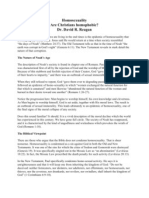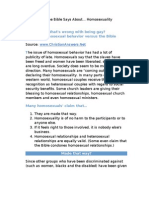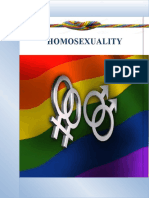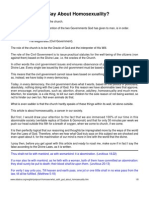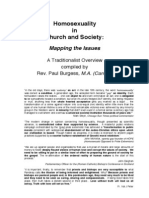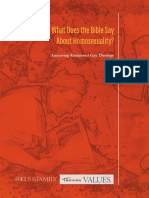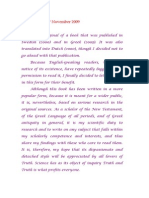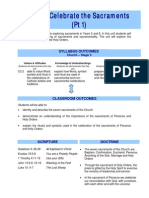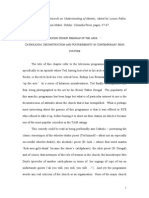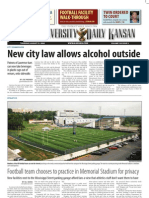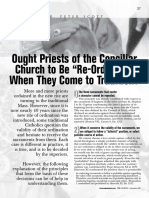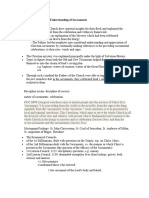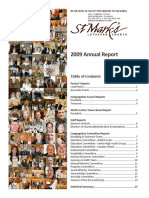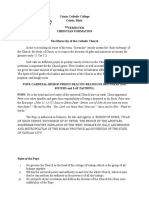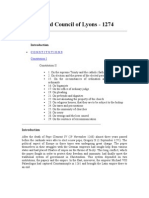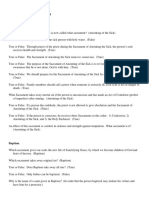Holy Apostles College & Seminary
Why Homosexuality is Immoral?
by
Sr. Hoa Hong Thi Nguyen
Prof. Mary Burns
ENG 181: Research and Writing
9 December 2021
�Outline
Introduction
I. Definition about Homosexuality
II. Causes of Homosexuality Immorality
1. Divine Law
2. Natural Law
III. Response of the Catholic Church on Homosexuality in marriage life
1. Catechism of the Catholic Church
2. Holy See and the Blessing of Same-sex Union
3. The Call to Chastity
IV. Homosexuality in the discerning vocation of the priesthood
1. Affective Maturity and Spiritual Priesthood
2. Homosexuality and Ordained Ministry
3. Discernment by the Church on the suitability of Candidates
Conclusion
Bibliography
1
� Introduction
Compared to a few decades ago, nowadays, homosexuality is very common and almost
everyone has accepted it. Typically, issues of homosexuality appear in newspapers, movies,
fashion, and even in many public places such as airports, supermarkets, amusement parks, or
sidewalks. Society did not consider this issue as discriminatory or overly sensitive, on the
contrary, it supported and promoted it as a legitimate human right. For young people, it is a way
of life or a tendency to live with a lot of freedom and pursue hedonism. For parents, even if they
are heartbroken, they still support the wishes of their only child to be transgender and live with
people of the same sex. Many families are at risk or have broken up in their marriage when they
find out that their spouse is homosexual. Therefore, for religions, especially Catholics,
homosexuality is a huge challenge in pastoral care as well as in religious life. Why is
homosexuality immoral and how do Catholics live human dignity according to God’s design?
This paper will first present a brief overview of the historical development of homosexuality,
then, the causes of homosexuality's immorality, and finally the Church’s response to the issue of
homosexuality in marriage life and discerning religious vocations.
I. Definition and History about Homosexuality
The prefix “homo” in the word homosexuality is derived from Greek meaning “same” and
not from Latin meaning “man.”1 Thus, homosexuality, according to the American Psychological
Association definition, is “sexual attraction or activity between members of the same sex.
Although the term can refer to homosexual orientation in both men and women, current practice
distinguishes between gay men and lesbians, and homosexuality itself is now commonly referred
John J. McNeill, The Church and the Homosexual: Fourth Edition, 4th ed. edition. (Boston: Beacon
1
Press, 1993), 39.
2
�to as same-sex sexual orientation or activity.”2 Homosexuality arises due to many causes mainly
psychological, organogenic, congenital in genetic, or environmental.3
Homosexuality has existed since ancient times in history for example The Isle of Lesbos,
600 BCE; Ancient Greece, 500-400 BCE; and Pharaonic Egypt, 330 BCE-30 CE.4At different
times and in various cultures, homosexual behavior has been approved, tolerated, punished, and
banned differently. Judeo-Christian, as well as Muslim cultures, generally consider homosexual
behavior to be sinful. In the 21st century, many societies have discussed sex and sexual practices
increasingly. Along with the growing acceptance of homosexuality as a universal expression of
human sexuality. The stereotypes of gay men as weak and effeminate and lesbians as masculine
and aggressive, which were prevalent in the West as recently as the 1950s and early 60s have
largely been eliminated.5
In most of Africa, Asia, and Latin America, both the subject and the behavior are
considered taboo. In Western countries, attitudes are somewhat more liberal. Although the topic
of homosexuality was rarely discussed in public forums in the early 20th century, it became a
political issue in many Western countries throughout the late 20th century. This is especially true
in the United States, where the gay rights movement is often considered a late branch of the
various civil rights movements of the 1960s.6 In general, people in richer and more developed
economies accept admitting homosexuality than those in less affluent and more developed
economies.7
2
“Homosexuality," APA Dictionary of Psychology, https://dictionary.apa.org.
3
Michael J. Buckley, Morality and the Homosexual: A Catholic Approach to a Moral Problem, 1St Ed.
(Newman Press, 1959), 35.
4
David Sharp, “All the Periods in History When Homosexuality Was Celebrated & Embraced,” at
Ranker, https://www.ranker.com.
5
“Homosexuality”, at Britannica, https://www.britannica.com.
6
“Homosexuality.”
7
Jacob Poushter and Nicholas Kent, “The Global Divide on Homosexuality Persists,” (25 June 2020),
https://www.pewresearch.org.
3
�II. Causes of Homosexuality Immorality
1. Divine Law
Denial of homosexual behavior is found and well known in the Old Testament. In
Genesis 19, two angels in disguise visit the city of Sodom and are welcomed and protected by
Lot. During the night, Sholokhov's men demanded that Lot hand over his guests for homosexual
intercourse. Lot refused, and the angels blinded the people of Sodom. Lot and his family
escaped, and the town was consumed by fire. In addition, Jude 7 records that Sodom and
Gomorrah “acted immorally and indulged in unnatural lusts.” Ezekiel also says that Sodom
committed “abominations things” (Ezekiel 16:50), possibly referring to homosexual and
heterosexual sinful acts.8
The Book of Leviticus has a clear condemnation that “You shall not lie with a male as
with a woman; it is an abomination … If a man lies with a male as with a woman, both of them
have committed an abomination; they shall be put to death, their blood is upon them” (Lev.
18:22, 20:13). Truly, different rituals were enacted by God for use in different periods and
cultures, but his moral requirements are eternal and binding upon all cultures. In the New
Testament, Paul also warns that homosexual behavior is one of the sins that will take away
heaven (1 Cor 6:9-10). In general, the entire Bible teaches about the inadmissibility of
homosexual behavior. Like other moral imperatives, it is rooted in the law of nature and is the
design that God has built into human nature.9
2. Natural Law
Humans with moral intuition are capable of distinguishing right and wrong behavior
when they are not natural. For example, a natural human mate is another human being, not an
8
“Homosexuality,” at Catholic Answers, https://www.catholic.com.
9
“Homosexuality.”
4
�animal. Likewise, a man’s natural partner is a woman and a woman’s natural partner is a man.
Therefore, homosexuality is unnatural. Natural law reasoning is the basis for almost every
standard moral intuition. This leads to a specific set of ethical principles such as the
inadmissibility of murder, kidnapping, mutilation, physical and emotional abuse, etc.10
Many homosexuals assert that they did not choose their status and that because they were
born that way, homosexual behavior became natural to them. However, just because something
is not picked doesn’t mean it was born. Some desires are acquired by habit and conditioning
rather than by conscious choice. For example, no one chooses to be an alcoholic, but they can
become accustomed to alcohol. So, one can have homosexual desires without consciously
choosing. Even with a genetic predisposition, homosexuality is still unnatural because it is still
not part of the natural human design.11
III. Response of the Catholic Church on Homosexuality in marriage life
1. Catechism of the Catholic Church
The Catechism of the Catholic Church teaches that Homosexual actions are “intrinsically
disordered.” They are contrary to the natural law. They close the sexual act to the gift of life.
They do not proceed from a genuine affective and sexual complementarity. Under no
circumstances can they be approved.12
2. Holy See and the Blessing of Same-sex Union
In keeping with the nature of the sacraments, when a blessing is invoked on particular
human relationships, apart from the right intentions of the participants, it is essential that what is
blessed be objectively ordered according to God’s designs inscribed in creation, and fully
10
“Homosexuality.”
11
“Homosexuality.”
12
Catechism of the Catholic Church, 2357, at The Holy See, w2.vatican.va.
5
�revealed by Jesus Christ.13 Besides, in Christian marriage, the purpose of the sexual act is to
manifest unity and procreation (CCC 2332). For this reason, the Church has no right to bless
same-sex unions. According to the Congregation for the Doctrine of the Faith, such blessings
cannot be “considered appropriate.” It is not allowed when priests bless same-sex couples. Pope
Francis in a recent document expressed his sincere desire to welcome and accompany
homosexual people, who are proposed as paths to faith growth. He blessed the individual but not
the same-sex couple. The apostolic exhortation Amoris Laetitia talks about helping people with
homosexual tendencies because they need to understand and fulfill God's will in their lives. 14
3. The Call to Chastity
Currently, the number of homosexuals is increasing day by day. Society is torn between
condemnation and compassion, fear, and curiosity, between attempts to make matters a joke and
the knowledge that it is nothing to be funny amidst deviations. This presents a great challenge for
the Church in pastoral work.15 However, Christians need to accept it with respect, compassion,
and sensitivity. Any signs of discrimination against them should be avoided. If they are
Christians, Christians in communities or parishes should accompany, share, and invite them to
unite with the sacrifice of Jesus on the cross in their present state (CCC 2358) so that they can be
called to give witnesses to charity with God’s grace.16 Especially in personal accompaniment,
priests provide them with psychological knowledge of homosexuality so that they are free to
discern and respond. It is important to help them answer the question of who they are in God's
loving plan. At the same time, priests must show them that they are always loved and respected
13
“Responsum of the Congregation for the Doctrine of the Faith to a Dubium Regarding the Blessing
of the Unions of Persons of the Same Sex,” (15 March 2021), https://press.vatican.va.
14
“Holy See: The Church Cannot Bless Same-Sex Unions," at Vatican News, (15 March 2021),
https://www.vaticannews.va.
15
“Essay: The Homosexual in America,” at Time, (21 January 1966), http://content.time.com.
16
United States Catholic Conference, Human Sexuality: A Catholic Perspective for Education and
Lifelong Learning (Washington, D.C.: United States Catholic Conference, 1991), 155.
6
�in God’s community. 17 Homosexuals are called to chastity. Through self-mastery, they have
inner freedom. Nevertheless, they always need the support of prayer and the grace of the
Sacraments so that they gradually move towards Christian perfection (CCC 2359).
In addition, in the context of gay forces raging today, Christian parents cannot afford to
play defensively alone. A deliberate, strategic plan to address the question of homosexuality with
our children is a huge spiritual consequence. Under the loving leadership of father and mother
and the local church, ethics must be guided by systematic, purposeful, and well-informed biblical
instruction. Homosexuality should be understood in the context of a comprehensive parental
strategy. Parents will benefit from setting biblical goals to answer questions about homosexuality
and form healthy heterosexuality in children. Unfortunately, homosexuality is often dealt with
psychologically rather than biblically in Christian literature. Therefore, to combat the tendency to
take a psychological approach, Christian parents must master the Biblical goals of parenting such
as glorification (1 Cor 10:31), salvation (1 Cor. 6:9-11), protection (Prov 3:1-2), instruction
(Prov 5:1-21), interpretation (Eph 5.3-6), ...18
IV. Homosexuality in the discerning vocation of the priesthood
1. Affective Maturity and Spiritual Priesthood
In addition to considering the issue of homosexuality in married life, this issue needs
attention in the formation of future priests. Through Baptism, all believers share in the priesthood
of Christ. This participation is known as the “common priesthood of the members” (CCC 1591).
Belief in apostolic succession and the primacy of the office of Peter is evident in Pope St.
Clément’s Letter to the Church of Corinth.19 Thus, according to the continuity of this succession
17
McNeill, The Church and the Homosexual, 156-157.
18
Richard L. Holland, “Christian Parenting and Homosexuality,” The Master’s Seminary Journey 19
(2008): 221-226.
19
Peter Samuel Kucer, Catholic Apologetics: Witnessing to and Defending the Faith (Saint Louis,
MO: En Route Books & Media, 2018), 297.
7
�in the Church, only one baptized person of the male sex is eligible to receive the Sacrament of
Holy Orders. Thus, by sacramental means, The Holy Spirit configures the candidate for Jesus
Christ in a new and concrete way: priests, in fact, sacramentally represent Christ, the head,
shepherd, and mate of the Church.20 Therefore, the entire life of a spiritual minister must be
animated by his total gift to the Church and by a genuine pastoral charity. For this reason,
candidates for ordained office must reach emotional maturity. With this maturity, priests will
have the correct relationships with both men, especially a growing sense of spiritual fatherhood
for the ecclesial community that will be entrusted to them.21
2. Homosexuality and Ordained Ministry
The question for priestly formation today is whether to admit into seminaries or religious
orders people with homosexual tendencies. The Church has had many Magisterium Documents
from the time of the Second Vatican Council to the present day that define the Church’s teaching
on homosexuality. The teachings distinguish between active homosexuality and homosexual
tendencies. As for the act, the Bible always presents them as mortal sins, and tradition has
always held them to be intrinsically immoral and against the natural law, so they are not
acceptable in all cases. However, deep-seated homosexual tendencies often present a challenge.
Such people must be accepted with respect and tact. Any sign of unfair discrimination against
them should be avoided. In the light of such teachings, it is not possible to admit into seminaries
or religious orders those who practice homosexuality, present deep-seated homosexual
tendencies, or support so-called “gay culture.”22
20
J. Michael Miller, “Criteria for the Discernment of Vocation for Persons with Homosexual
Tendencies,” https://www.vatican.va.
21
“Criteria for the Discernment of Vocation for Persons with Homosexual Tendencies.”
22
“Criteria for the Discernment of Vocation for Persons with Homosexual Tendencies.”
8
� In fact, those with deep-seated homosexual tendencies are aware that they cannot have
right and healthy relationships. This would have serious consequences that could arise in their
ordination, so such seminarians should not be ignored and accepted. However, in cases in which
homosexuality is only a temporary matter, for example, the trend of adolescence has not been
replaced seminarians will be reviewed and corrected for at least three years prior to their
ordination to the diaconate.23Therefore, Pope Francis in the book “The Strength of Vocation”,
said that homosexuality in the Church “is something worries me” and reminded that candidates
are “humanly and emotionally mature” before they can be ordained.24
3. Discernment by the Church on the suitability of Candidates
A vocation is a gift of divine grace, received through the Church, within the Church, and
to the service of the Church. Two elements are inseparable from every priestly vocation: the gift
of God and the responsible freedom of man. In response to God’s call, man freely gives himself
to him in love. However, just wanting to become a priest is not enough. Therefore, the Church,
with the responsibility of determining the requirements necessary for the reception of the
sacraments instituted by Christ, must determine the suitability of candidates wishing to enter the
seminary by accompanying them throughout the formation time and will be ordained if he is
judged to have the necessary qualities.25
The formation of future priests usually has four dimensions including human, spiritual,
intellectual, and pastoral. Before accepting a candidate for ordination, the Church must verify
that the candidate has reached emotional maturity and must come to a certain moral assessment
of his qualifications. In addition, in discussions with candidates, the spiritual director must
23
“Criteria for the Discernment of Vocation for Persons with Homosexual Tendencies.”
24
Philip Pullella, “Be Celibate or Leave the Priesthood, Pope Tells Gay Priests,” at Reuters, (2
December 2018), https://www.reuters.cơm.
25
“Criteria for the Discernment of Vocation for Persons with Homosexual Tendencies.”
9
�specifically address the Church’s requirements regarding priestly chastity and the emotional
maturity that characterizes priests as well as helping him to discern whether he has the necessary
qualities or not.26 Homosexuality is incompatible with the calling priest. For, in the end, their
attitude towards men or women is somehow distorted, out of place, and, in any case, is not
within the direction of creation of which we have spoken. The Congregation for Education
issued a decision a few years ago with the effect that homosexual candidates cannot become
priests because their sexual orientation prevents them from having a proper sense of fatherhood
and from the intrinsic nature of the priest.27 Therefore, if a candidate practices homosexuality or
has deep-seated homosexual tendencies, it is the duty of his spiritual director as well as his
confessor to advise him in conscience to move forward with ordination. It would be dishonest for
a candidate to conceal his homosexuality in order to proceed, despite everything, towards
ordination. Such an attitude of deceit is incompatible with the spirit of truth, fidelity, and
openness that should characterize the personality of the person who believes he or she is called to
serve Christ and His Church in the ministerial priesthood.28
V. Conclusion
In summary, God created all things good, and man is the pinnacle of creation because
man is made in the image of God. Certainly, no one is born into this life wanting to be
sympathetic and the need for sex is a natural human need. However, homosexuality is contrary to
Divine law and Natural law. It violates the purpose of marriage and the sexual act, so it is not
approved under all circumstances. Therefore, the Church cannot bless the same-sex union, but
the Church understands, welcomes, accompanies, and blesses those who are considered
“Criteria for the Discernment of Vocation for Persons with Homosexual Tendencies.”
26
Brian Mullady, “Pope Benedict XVI on the Priesthood and Homosexuality,” The Linacre Quarterly
27
78, (2011), 296.
28
“Criteria for the Discernment of Vocation for Persons with Homosexual Tendencies.”
10
�homosexual. They are called to live a life of chastity and to share in the sufferings of Jesus on the
cross. For this reason, the Church needs mature and healthy priests to have the right relationships
with both men and women, especially so that they can accompany homosexuals and lead the
Catholic community. Thus, the discernment and formation of candidates for the sacrament of
Holy Orders are very important in today’s priestly formation. With a society of consumerism and
individualism upheld, the demand for legal rights of homosexuals in the Church is increasing.
The Church is both called to stand firm on what Jesus established in the Sacraments and at the
same time to be a witness of God’s love for people today. To do that, all members of the Church
work together to cooperate with God's grace to sanctify their own cross and glorify God in their
state of life.
Bibliography
Buckley, Michael J. Morality and the Homosexual: A Catholic Approach to a Moral Problem.
1St Edition. Newman Press, 1959.
“Criteria for the Discernment of Vocation for Persons with Homosexual Tendencies.”
Https://www.vatican.va.
“Essay: The Homosexual in America.” At Time, 21 January 1966, http://content.time.com.
Holland, Richard L. “Christian Parenting and Homosexuality.” The Master’s Seminary Journal
19, 2008, 217–231
“Holy See: The Church Cannot Bless Same-Sex Unions.” At Vatican News, 15 March 2021,
https://www.vaticannews.va.
“Homosexuality.” At APA Dictionary of Psychology, https://dictionary.apa.org.
“Homosexuality.” At Britannica, https://www.britannica.com.
11
�“Homosexuality.” At Catholic Answers, https://www.catholic.com.
Kucer, Peter Samuel. Catholic Apologetics: Witnessing to and Defending the Faith. Saint Louis,
MO: En Route Books & Media, 2018.
McNeill, John J. The Church and the Homosexual: Fourth Edition. 4th ed. edition. Boston:
Beacon Press, 1993.
Mullady, Brian. “Pope Benedict XVI on the Priesthood and Homosexuality.” The Linacre
Quarterly 78, (2011): 294–305.
Poushter, Jacob and Nicholas Kent. “The Global Divide on Homosexuality Persists.” 25 June
2020, https://www.pewresearch.org.
Pullella, Philip. “Be Celibate or Leave the Priesthood, Pope Tells Gay Priests.” At Reuters, 2
December 2018, https://www.reuters.cơm.
Responsum of the Congregation for the Doctrine of the Faith to a Dubium Regarding the
Blessing of the Unions of Persons of the Same-Sex.” Https://press.vatican.va.
Sharp, David. “All the Periods in History When Homosexuality Was Celebrated & Embraced.”
At Ranker, https://www.ranker.com.
United States Catholic Conference. Human Sexuality: A Catholic Perspective for Education and
Lifelong Learning. Washington, D.C.: United States Catholic Conference, 1991.
12
